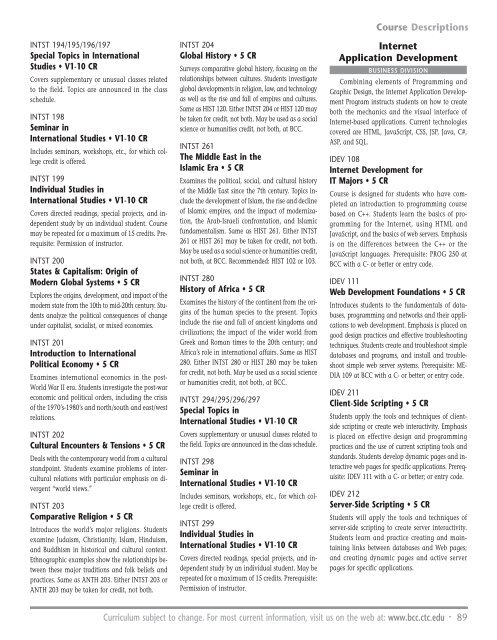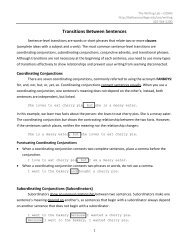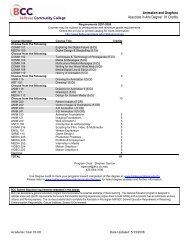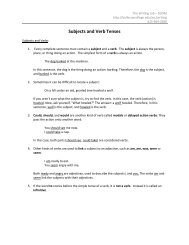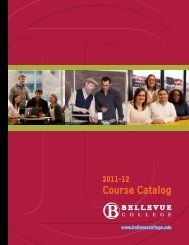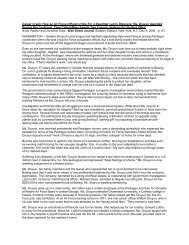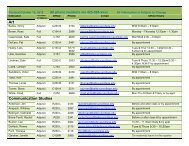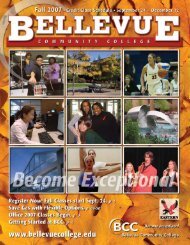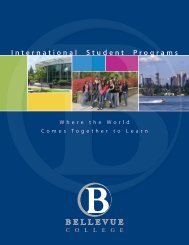2003 / 2004 - Bellevue College
2003 / 2004 - Bellevue College
2003 / 2004 - Bellevue College
Create successful ePaper yourself
Turn your PDF publications into a flip-book with our unique Google optimized e-Paper software.
INTST 194/195/196/197<br />
Special Topics in International<br />
Studies • V1-10 CR<br />
Covers supplementary or unusual classes related<br />
to the field. Topics are announced in the class<br />
schedule.<br />
INTST 198<br />
Seminar in<br />
International Studies • V1-10 CR<br />
Includes seminars, workshops, etc., for which college<br />
credit is offered.<br />
INTST 199<br />
Individual Studies in<br />
International Studies • V1-10 CR<br />
Covers directed readings, special projects, and independent<br />
study by an individual student. Course<br />
may be repeated for a maximum of 15 credits. Prerequisite:<br />
Permission of instructor.<br />
INTST 200<br />
States & Capitalism: Origin of<br />
Modern Global Systems • 5 CR<br />
Explores the origins, development, and impact of the<br />
modern state from the 10th to mid-20th century. Students<br />
analyze the political consequences of change<br />
under capitalist, socialist, or mixed economies.<br />
INTST 201<br />
Introduction to International<br />
Political Economy • 5 CR<br />
Examines international economics in the post-<br />
World War II era. Students investigate the post-war<br />
economic and political orders, including the crisis<br />
of the 1970’s-1980’s and north/south and east/west<br />
relations.<br />
INTST 202<br />
Cultural Encounters & Tensions • 5 CR<br />
Deals with the contemporary world from a cultural<br />
standpoint. Students examine problems of intercultural<br />
relations with particular emphasis on divergent<br />
“world views.”<br />
INTST 203<br />
Comparative Religion • 5 CR<br />
Introduces the world’s major religions. Students<br />
examine Judaism, Christianity, Islam, Hinduism,<br />
and Buddhism in historical and cultural context.<br />
Ethnographic examples show the relationships between<br />
these major traditions and folk beliefs and<br />
practices. Same as ANTH 203. Either INTST 203 or<br />
ANTH 203 may be taken for credit, not both.<br />
INTST 204<br />
Global History • 5 CR<br />
Surveys comparative global history, focusing on the<br />
relationships between cultures. Students investigate<br />
global developments in religion, law, and technology<br />
as well as the rise and fall of empires and cultures.<br />
Same as HIST 120. Either INTST 204 or HIST 120 may<br />
be taken for credit, not both. May be used as a social<br />
science or humanities credit, not both, at BCC.<br />
INTST 261<br />
The Middle East in the<br />
Islamic Era • 5 CR<br />
Examines the political, social, and cultural history<br />
of the Middle East since the 7th century. Topics include<br />
the development of Islam, the rise and decline<br />
of Islamic empires, and the impact of modernization,<br />
the Arab-Israeli confrontation, and Islamic<br />
fundamentalism. Same as HIST 261. Either INTST<br />
261 or HIST 261 may be taken for credit, not both.<br />
May be used as a social science or humanities credit,<br />
not both, at BCC. Recommended: HIST 102 or 103.<br />
INTST 280<br />
History of Africa • 5 CR<br />
Examines the history of the continent from the origins<br />
of the human species to the present. Topics<br />
include the rise and fall of ancient kingdoms and<br />
civilizations; the impact of the wider world from<br />
Greek and Roman times to the 20th century; and<br />
Africa’s role in international affairs. Same as HIST<br />
280. Either INTST 280 or HIST 280 may be taken<br />
for credit, not both. May be used as a social science<br />
or humanities credit, not both, at BCC.<br />
INTST 294/295/296/297<br />
Special Topics in<br />
International Studies • V1-10 CR<br />
Covers supplementary or unusual classes related to<br />
the field. Topics are announced in the class schedule.<br />
INTST 298<br />
Seminar in<br />
International Studies • V1-10 CR<br />
Includes seminars, workshops, etc., for which college<br />
credit is offered.<br />
INTST 299<br />
Individual Studies in<br />
International Studies • V1-10 CR<br />
Covers directed readings, special projects, and independent<br />
study by an individual student. May be<br />
repeated for a maximum of 15 credits. Prerequisite:<br />
Permission of instructor.<br />
Course Descriptions<br />
Internet<br />
Application Development<br />
BUSINESS DIVISION<br />
Combining elements of Programming and<br />
Graphic Design, the Internet Application Development<br />
Program instructs students on how to create<br />
both the mechanics and the visual interface of<br />
Internet-based applications. Current technologies<br />
covered are HTML, JavaScript, CSS, JSP, Java, C#,<br />
ASP, and SQL.<br />
IDEV 108<br />
Internet Development for<br />
IT Majors • 5 CR<br />
Course is designed for students who have completed<br />
an introduction to programming course<br />
based on C++. Students learn the basics of programming<br />
for the Internet, using HTML and<br />
JavaScript, and the basics of web servers. Emphasis<br />
is on the differences between the C++ or the<br />
JavaScript languages. Prerequisite: PROG 250 at<br />
BCC with a C- or better or entry code.<br />
IDEV 111<br />
Web Development Foundations • 5 CR<br />
Introduces students to the fundamentals of databases,<br />
programming and networks and their applications<br />
to web development. Emphasis is placed on<br />
good design practices and effective troubleshooting<br />
techniques. Students create and troubleshoot simple<br />
databases and programs, and install and troubleshoot<br />
simple web server systems. Prerequisite: ME-<br />
DIA 109 at BCC with a C- or better; or entry code.<br />
IDEV 211<br />
Client-Side Scripting • 5 CR<br />
Students apply the tools and techniques of clientside<br />
scripting or create web interactivity. Emphasis<br />
is placed on effective design and programming<br />
practices and the use of current scripting tools and<br />
standards. Students develop dynamic pages and interactive<br />
web pages for specific applications. Prerequisite:<br />
IDEV 111 with a C- or better; or entry code.<br />
IDEV 212<br />
Server-Side Scripting • 5 CR<br />
Students will apply the tools and techniques of<br />
server-side scripting to create server interactivity.<br />
Students learn and practice creating and maintaining<br />
links between databases and Web pages;<br />
and creating dynamic pages and active server<br />
pages for specific applications.<br />
Curriculum subject to change. For most current information, visit us on the web at: www.bcc.ctc.edu • 89


